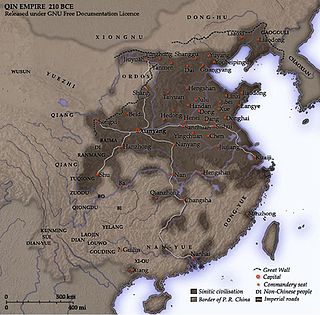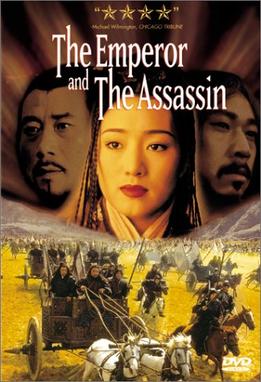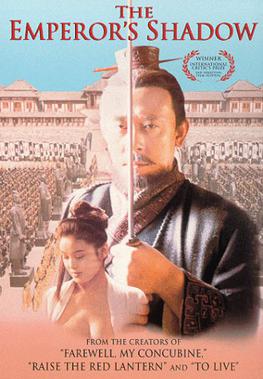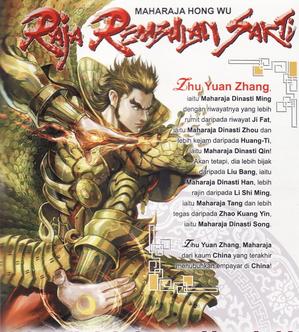
The Qin dynasty was the first dynasty of Imperial China. Named for its origin in the state of Qin,a fief of the confederal Zhou dynasty which had endured for over five centuries—until 221 BC,when it assumed an imperial prerogative following its complete conquest of its rival states,a state of affairs that lasted until its collapse in 206 BC. It was formally established after the conquests in 221 BC,when Ying Zheng,who had become king of the Qin state in 246,declared himself to be "Shi Huangdi",the first emperor.

Qin Shi Huang was the founder of the Qin dynasty and the first Emperor of China. Rather than maintain the title of "king" borne by the previous Shang and Zhou rulers,he assumed the invented title of "emperor",which would see continuous use by monarchs in China for the next two millennia.
Li Si was a Chinese calligrapher,philosopher,and politician of the Qin dynasty. He served as Chancellor from 246 to 208 BC,first under King Zheng of the state of Qin—who later became Qin Shi Huang,the "First Emperor" of the Qin dynasty. He then served under Qin Er Shi,Qin Shi Huang's eighteenth son and the second emperor. Concerning administrative methods,Li Si is said to have admired and utilized the ideas of Shen Buhai",repeatedly referring to the technique of Shen Buhai and Han Fei,but regarding law followed Shang Yang.

The Emperor and the Assassin,also known as The First Emperor,is a 1998–1999 Chinese historical romance film based primarily on Jing Ke's assassination attempt on the King of Qin,as described in Sima Qian's Records of the Grand Historian. The film was directed by Chen Kaige and stars Gong Li,Zhang Fengyi,Li Xuejian,and Zhou Xun. The film was well received critically and won the Technical Prize at the 1999 Cannes Film Festival. It was the most expensive Chinese film made up to that time,costing US$20 million.

The Emperor's Shadow is a 1996 Chinese historical film directed by Zhou Xiaowen and starring Jiang Wen,Ge You,Xu Qing and Ge Zhijun. It was the most expensive Chinese film produced at the time of its release.

LüBuwei was a Chinese merchant and politician of the Qin state during the Warring States period. Originally an influential merchant from the Wey (衛) state,LüBuwei met and befriended King Zhuangxiang of Qin,who was then a minor prince serving as a hostage in the Zhao state. Through bribes and machinations,LüBuwei succeeded in helping King Zhuangxiang become the heir apparent to the Qin throne. In 249 BCE,after King Zhuangxiang ascended the throne following the death of his father,King Xiaowen,he appointed LüBuwei as his chancellor (相國) and ennobled him as "Marquis Wenxin" (文信侯). After King Zhuangxiang's death in 247 BCE,LüBuwei became the chancellor and regent to King Zhuangxiang's young son,Ying Zheng,who later became Qin Shi Huang.

The Myth is a 2005 Hong Kong—Chinese martial arts fantasy-adventure film directed by Stanley Tong,starring Jackie Chan,Tony Leung Ka-fai,Kim Hee-sun,and Mallika Sherawat.

The burning of books and burying of scholars was the purported burning of texts in 213 BCE and live burial of 460 Confucian scholars in 212 BCE ordered by Chinese emperor Qin Shi Huang. The events were alleged to have destroyed philosophical treatises of the Hundred Schools of Thought,with the goal of strengthening the official Qin governing philosophy of Legalism.
Meng Tian ) was a Chinese inventor and military general of the Qin dynasty who distinguished himself in campaigns against the Xiongnu and in the construction of the Great Wall of China. He was the elder brother of Meng Yi. He descended from a great line of military generals and architects. His grandfather,Meng Ao,was a general from the era of King Zhao;and his father,Meng Wu,was also a general who served as a deputy to Wang Jian.

The Legend of Qin,also Qin's Moon,is a CG Chinese animated wuxia TV series produced by Robin Shen (沈乐平),and directed by Chen Qianyuan (陈乾元). The story is based on novel of the same name by Taiwanese writer and entrepreneur Sayling Wen. It is China's first 3D animation,produced by Sparkly Key Animation Studio in Hangzhou,Zhejiang. The series was first broadcast around Chinese New Year in 2007.

Legend of Emperors is a Hong Kong manhua series drawn and written by Wong Yuk-long. It was first published in 1993. It features fictionalised stories of various ancient Chinese rulers,incorporating elements of wuxia and Chinese mythology as well. In Malaysia,the series' title is renamed Alam Perwira,which means World of Warriors.
Meng Yi was a Chinese military general and politician. As an official of the Qin dynasty,he served in the court of Qin Shi Huang. He was a younger brother of the general Meng Tian. After Qin Shi Huang's death,Meng Yi and his brother were executed by Qin Er Shi on the urging of Zhao Gao.

Qin's wars of unification were a series of military campaigns launched in the late 3rd century BC by the state of Qin against the other six powers remaining in China —Han,Zhao,Yan,Wei,Chu and Qi. Between 247 and 221 BC,Qin had developed into one of the most powerful of China's Seven Warring States that coalesced in the wake of the Zhou dynasty's decline,by now retaining a weak and merely ceremonial position among the warring states. In 230 BC,King Ying Zheng of Qin began the sequence of campaigns that would bring the Warring States period to a close,setting out to conquer each remaining sovereign one by one. This was completed in 221 BC with the fall of Qi,leaving the former Zhou sphere unified under a more centralized Qin control. Ying Zheng declared himself the First Emperor,or Qin Shi Huang—becoming the first sovereign over a unified China under the imperial Qin dynasty.

The Epang Palace was a Chinese palace complex built during the reign of Qin Shi Huang,the first emperor of China and the founder of the short-lived Qin dynasty. It is located in western Xi’an,Shaanxi Province. Archaeologists believe that only the front hall was completed before the capital was sacked in 206 BCE.

Qin Shi Huang is a Chinese historical drama television series based on the life of Qin Shi Huang,the first emperor who unified China under the Qin dynasty,in 221 BC. The series was filmed between 1999 and 2000 and first released in 2001 in Hong Kong and Thailand,and in 2002 in Singapore. In China,the series was edited and altered by historians and experts before it was approved for broadcast on CCTV-1,in 2001.
Qin Shi Huang was the founder and first emperor of the Qin dynasty.

The Patriot Yue Fei is a 2013 Chinese television series based on the life of Yue Fei,a Song dynasty general widely regarded as a patriot and national hero in Chinese culture for his role in defending the Song empire against the Jurchen campaigns. While the plot is based on historical sources,it also includes elements of fiction and draws ideas from the novel General Yue Fei (說岳全傳) and other folktales on the general's life.

The Mausoleum of the First Qin Emperor is the mausoleum of Qin Shi Huang,the first emperor of the Qin dynasty.

The Empress of China is a 2014 Chinese television series based on events in the 7th and 8th-century Tang dynasty,starring producer Fan Bingbing as the titular character Wu Zetian—the only female emperor in Chinese history.

Nirvana in Fire 2 is a 2017 Chinese television series starring Huang Xiaoming,Liu Haoran,Tong Liya and Zhang Huiwen. It is the sequel to Nirvana in Fire,which is based on Hai Yan's novel with the same name. The stories take place after the events of the original series,which revolves around the Langya Hall. The series aired on Dragon TV and Beijing TV from December 18,2017 to February 12,2018.
















